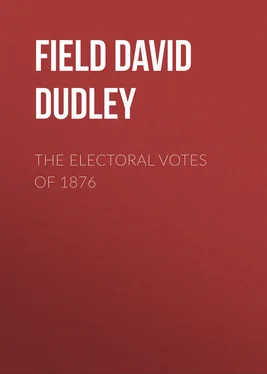In approving this resolution President Lincoln accompanied it with the following message, parts of which I will italicize:
" To the Honorable the Senate and House of Representatives:
"The joint resolution entitled 'joint resolution declaring certain States not entitled to representation in the electoral college,' has been signed by the Executive, in deference to the view of Congress implied in its passage and presentation to him. In his own view, however, the two Houses of Congress, convened under the twelfth article of the Constitution, have complete power to exclude from counting all electoral votes deemed by them to be illegal , and it is not competent for the Executive to defeat or obstruct that power by a veto, as would be the case if his action were at all essential in the matter. He disclaims all right of the Executive to interfere in any way in the canvassing or counting electoral votes, and also disclaims that by signing said resolution he has expressed any opinion on the recitals of the preamble, or any judgment of his own upon the subject of the resolution."
If this resolution of the two Houses was authorized by the Constitution, there is no ground for maintaining the power of the President of the Senate to decide the question of receiving or rejecting votes. For, if he has the power under the Constitution, he cannot waive it, nor can any action of Congress take it away. The resolution of 1865 had the sanction of each House, was signed by the President of the Senate and the Speaker of the House, and was approved by the President. It should set the question of the power of the two Houses forever at rest.
The joint rule, first adopted in 1865, and continued in force for ten years, asserted the same control. It should not have been adopted if the pretensions now set up for the President of the Senate were of force; and he might at any time have disregarded it as worthless. But he did not disregard it; he did not question it; he obeyed it.
The action of the present Houses, moreover, is an affirmance of their right to eliminate the false votes from the true. Else why these committees of each House, investigating at Washington and in the North and South? Are all the labor and expense of these examinations undertaken solely in order that the results may be laid before the President of the Senate for his supreme judgment in the premises? It is safe to say that there is not a single member of either House who would not laugh you in the face for asking seriously the question.
Assuming, then, that the power to decide what votes shall be counted belongs to the two Houses, how must they exercise it? Here, again, let me take the illustration with which I began, of the coins upon a banker's counter. Let us suppose that, instead of one clerk, two were told to count them together. When they came to a particular coin upon which they disagreed, one insisting that it was genuine and the other that it was counterfeit, what would then happen, if they did their duty? They would count the rest and lay that aside, reporting the disagreement to their superior. The two Houses of Congress have, however, no superior, except the States and the people. To these there can be no reference on the instant; and the action of the two Houses must be final for the occasion.
Конец ознакомительного фрагмента.
Текст предоставлен ООО «ЛитРес».
Прочитайте эту книгу целиком, купив полную легальную версию на ЛитРес.
Безопасно оплатить книгу можно банковской картой Visa, MasterCard, Maestro, со счета мобильного телефона, с платежного терминала, в салоне МТС или Связной, через PayPal, WebMoney, Яндекс.Деньги, QIWI Кошелек, бонусными картами или другим удобным Вам способом.












